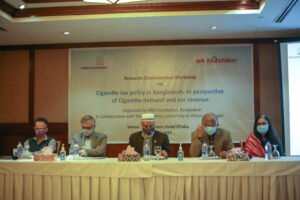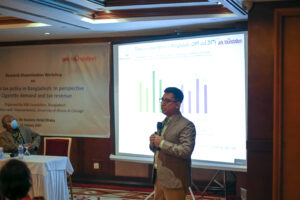A workshop was organized by ARK Foundation in collaboration with the Tobacconomics on January 12, 2022 to share findings from two recently conducted research studies as a part of their commitment to accelerate progress on tobacco taxes in Low- and Middle-Income Countries. Bangladesh has one of the largest populations of tobacco users in the world. According to the Global Adult Tobacco Survey (GATS) 2017, overall cigarette smoking prevalence is 14 percent among adults and 28.7 percent among men.
SM Abdullah, Associate Professor of Economics at the University of Dhaka and researcher at the ARK Foundation, presented a paper which focused on the estimation of cigarette demand responsiveness against price using GATS 2009 and 2017 data. While sharing the research findings he said that a ten percent increase in the price of cigarettes would reduce overall cigarette smoking among people by 7.1 percent.
He also said that increasing the price of cigarettes reduces smoking participation and encourages smokers to smoke less. He suggested the government to introduce specific tax on cigarette and increase the price substantially to reduce cigarette smoking prevalence in Bangladesh. He also suggested adjusting the prices of cigarettes annually for inflation and income growth to reduce the affordability of cigarettes.
Another paper was presented in the event by Md. Nazmul Hossain, Assistant Professor of Economics at the University of Dhaka and researcher at the ARK Foundation. He said that Bangladesh has a very complicated multi-tiered cigarette tax structure which has made tobacco tax a less effective instrument to control cigarette smoking. “The significantly lower price, together with a lower excise tax for low-tier cigarettes, created a window of opportunity for the manufacturers to expand low tier cigarette market which resulted in lower tax revenues for the government”, he made the remark while sharing his research findings.
The research shows that the introduction of a new low-tier cigarette in FY 2019-20 has caused a significant revenue loss of 273.5 crore taka for the government. The research also finds that had the government imposed a policy combining an increase in the base price of low-tier cigarettes from 37 to 45 taka along with uniform ad valorem excise tax rate of 65% for all tiers, the government tax revenue would have been 1958.4 crore taka higher than the actual tax revenue in FY 2019-20. Mr. Nazmul strongly suggested increasing the base price along with an increase in the excise tax rate for low-tier cigarettes.
Professor Dr Rumana Huque, Executive Director, ARK Foundation led the research team in conducting these two studies. She said that, Bangladesh primarily needs to design and implement a specific tax structure to reduce the use of tobacco. She suggested increasing the price of cigarette so that it becomes unaffordable for the general people and also recommended stopping the purchase and sale of single stick cigarettes to reduce its consumption. “To dream of a tobacco free country by 2041 as per Prime Minister’s vision, we need to design and implement an effective tobacco tax policy as soon as possible” said Professor Rumana.
Dr Nasiruddin Ahmed, Former NBR Chairman, who was present in the workshop, said that the government’s share in the tobacco companies allows the tobacco industry to continously interfere in the policy making process. He called for collective action from all concerned stakeholders and recommended building up a national movement to reduce tobacco usage.
Dr. Sohel Reza Choudhury, Professor & Chairman, Department of Epidemiology & Research at the National Heart Foundation Hospital and Research Institute said that effective taxation is the most effective instrument in controlling tobacco. He applauded the conducted research studies and said that the findings would be extremely helpful in designing policies to reduce cigarette smoking among people.
Mr. Mostafizur Rahman, Lead Policy Advisor, Campaign for Tobacco Free Kids (CTFK-Bangladesh) focused on the importance of increasing cigarette prices and excise duties to reduce smoking prevalence in Bangladesh. He suggested creating widespread awareness about the harmful effects of cigarette smoking. He said that the findings generated from the studies would be helpful in forwarding advocacy campaigns against tobacco use.
Advocate Syed Mahbubul Alam Tahin, Secretary, Center for Law and Policy Affairs, said that the tobacco companies spread misinformation whenever there is a talk about increasing tobacco taxes. He also said that the companies use external as well as internal influence to interfere in the government decision making system. As a result, the government fails to devise effective strategies to control tobacco. He suggested bringing changes in the existing tax policies and recommended strong implementation of the tax laws to reduce cigarette smoking and tobacco usage.
The event was also joined by development workers, tobacco control advocates, academicians, students, policy makers, and media outlets.
Media Coverage:




